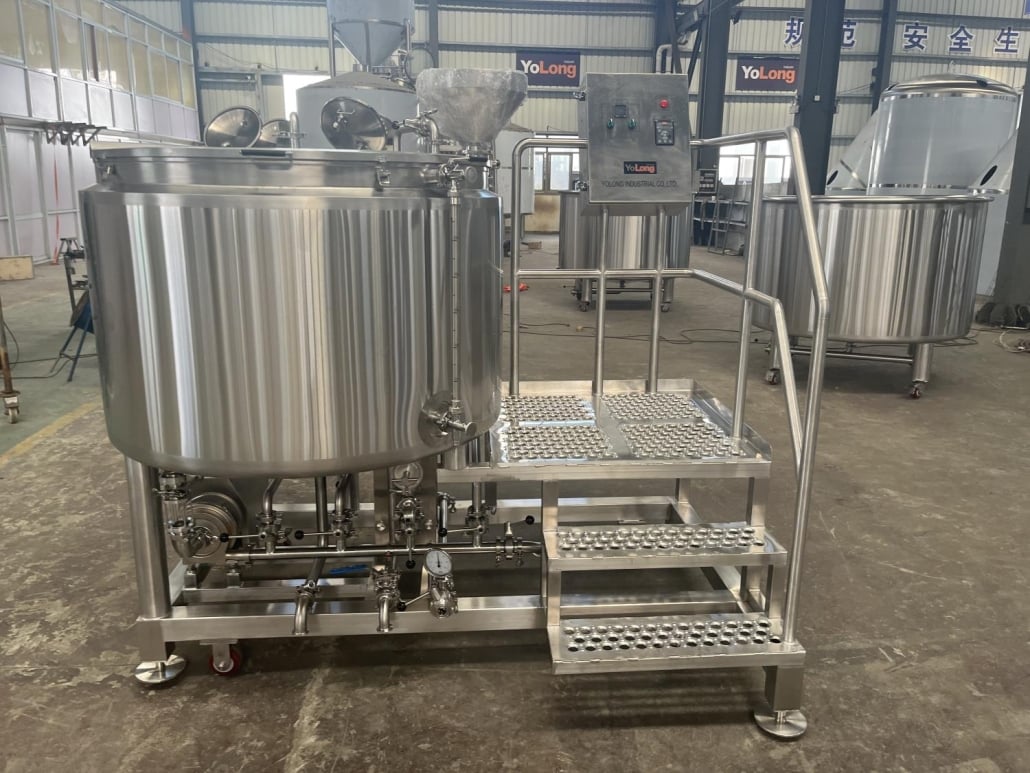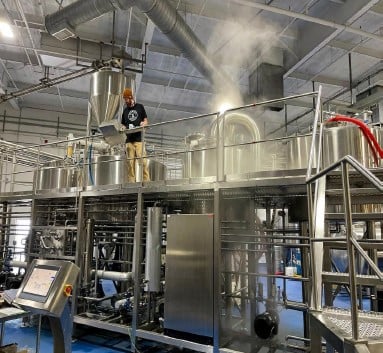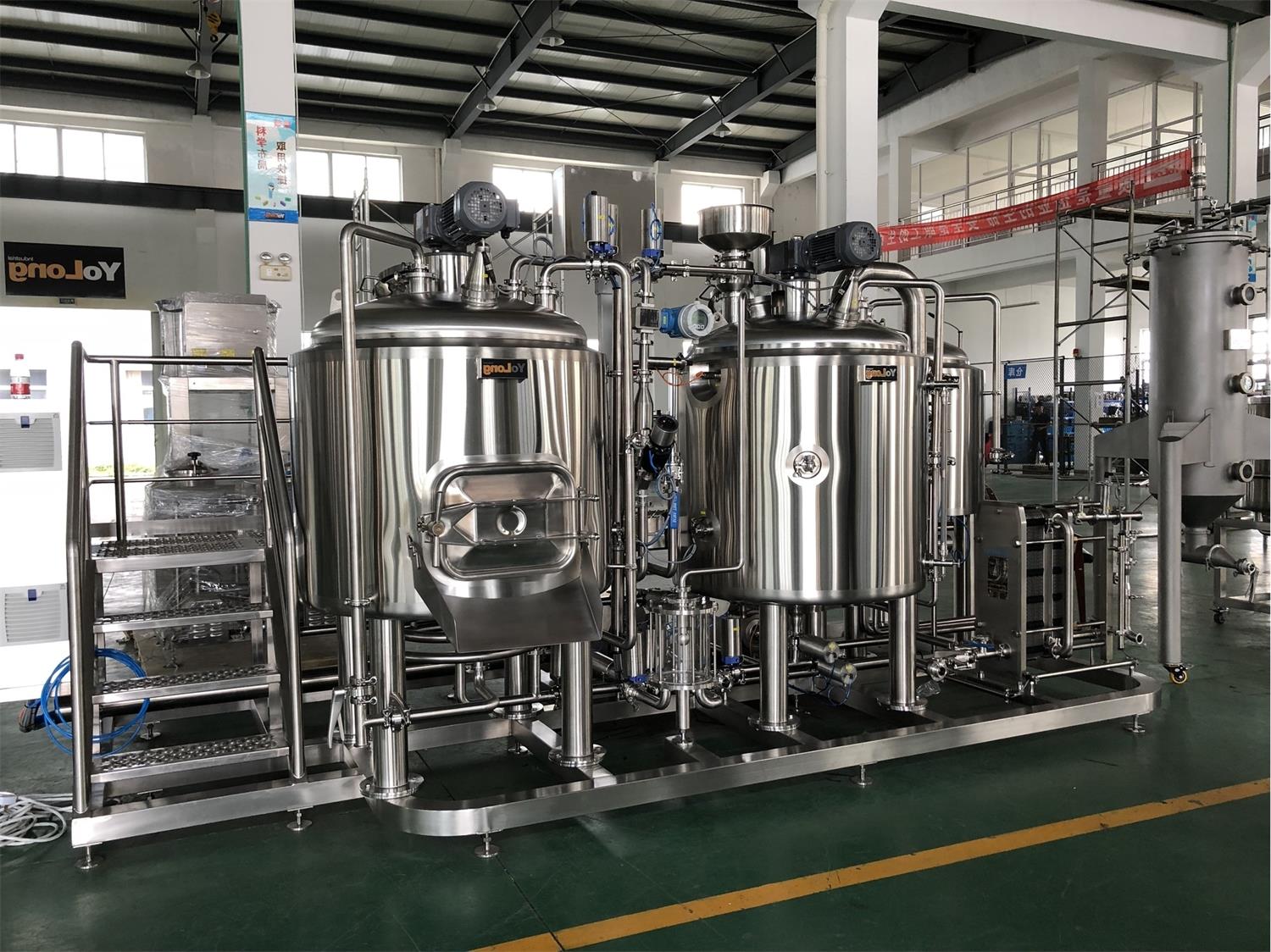The Guide to Starting a Mini Brewery
Welcome to the comprehensive guide on starting your very own mini brewery! If you’ve ever dreamt of crafting unique, delicious beers and sharing them with friends, family, and even the public, you’re in the right place. This article will walk you through everything you need to know about mini breweries, from equipment to brewing processes, and even how to choose the best suppliers.
Overview
Starting a mini brewery is an exciting venture that combines the art of brewing with the science of production. This guide will cover all the essential aspects to help you navigate the journey from a beer enthusiast to a successful brewery owner.
Brewing Equipment Essentials
When setting up a mini brewery, choosing the right equipment is crucial. The key components you’ll need include:
- Brewing Kettle: The heart of your brewing system where wort is boiled.
- Fermentation Tanks: Where the magic of fermentation happens.
- Mash Tun: Used for mashing grains to extract fermentable sugars.
- Wort Chiller: Essential for cooling the wort quickly after boiling.
- Pumps and Valves: For moving liquids between vessels.
- Cleaning and Sanitizing Equipment: To maintain hygiene standards.

Equipment Types and Functions
| Equipment | Function |
|---|---|
| Brewing Kettle | Boils the wort and integrates hops for flavor. |
| Fermentation Tanks | Houses the wort during fermentation, where yeast converts sugars into alcohol and CO2. |
| Mash Tun | Mashes the grains, facilitating the extraction of fermentable sugars. |
| Wort Chiller | Rapidly cools the wort post-boiling to prepare it for fermentation. |
| Pumps and Valves | Transfers liquids between different stages of the brewing process. |
| Cleaning Equipment | Ensures all brewing equipment is sanitized to avoid contamination. |
The Brewing Process
Brewing beer is a meticulous process that involves several stages, each crucial for crafting the perfect brew.
Step-by-Step Brewing
- Mashing: Combine milled grains with hot water in the mash tun to extract sugars.
- Lautering: Separate the liquid wort from the spent grain.
- Boiling: Boil the wort in the brewing kettle, adding hops at various stages for bitterness, flavor, and aroma.
- Cooling: Use the wort chiller to quickly cool the boiled wort to fermentation temperature.
- Fermentation: Transfer the wort to fermentation tanks, add yeast, and allow fermentation to occur.
- Conditioning: Allow the beer to mature and develop its flavors.
- Packaging: Once conditioned, the beer is ready to be packaged into bottles, cans, or kegs.
Brewing Process in Detail
| Stage | Description |
|---|---|
| Mashing | Mixing crushed grains with hot water to activate enzymes that convert starches into fermentable sugars. |
| Lautering | Separating the liquid wort from the grain husks after mashing. |
| Boiling | Boiling the wort to sterilize it and add hops for bitterness and aroma. |
| Cooling | Rapidly cooling the wort to a temperature suitable for fermentation. |
| Fermentation | Yeast converts sugars in the wort into alcohol and carbon dioxide. |
| Conditioning | Allowing the beer to age, develop flavors, and carbonate. |
| Packaging | Transferring the finished beer into bottles, cans, or kegs for distribution and consumption. |
Mini Brewery Design and Customization
Designing a mini brewery involves careful consideration of space, layout, and customization options to ensure efficient operation and scalability.
Capacity and Space Requirements
| Capacity | Space Needed | Design Considerations |
|---|---|---|
| 1-3 BBL | 200-500 sq. ft. | Suitable for small spaces, home setups, or microbreweries. |
| 3-7 BBL | 500-1000 sq. ft. | Requires a dedicated brewing area with room for expansion. |
| 7-15 BBL | 1000-2000 sq. ft. | Best for larger mini breweries with commercial production. |
Customization Options
| Aspect | Customization Details |
|---|---|
| Brewhouse Design | Tailor the layout and equipment to your specific brewing style and space. |
| Aesthetic Choices | Choose from a variety of finishes and materials for tanks and kettles to match your brewery’s theme. |
| Automation Level | Decide between manual, semi-automated, or fully automated systems based on budget and expertise. |
Choosing the Right Suppliers
Selecting reliable suppliers for your mini brewery is essential for quality equipment and smooth operations.
Key Factors to Consider
| Supplier Evaluation | Details |
|---|---|
| Reputation | Look for suppliers with positive reviews and proven track records. |
| Cost vs. Quality | Balance initial investment with long-term durability and performance. |
| Customer Support | Ensure they offer excellent after-sales service and technical support. |
| Customization Options | Check if they provide tailored solutions to fit your specific needs. |
Popular Suppliers and Price Ranges
| Supplier | Price Range (USD) | Specialty |
|---|---|---|
| BrewTech Solutions | $10,000 – $50,000 | Customizable, high-quality brewing systems. |
| MiniBrew Co. | $15,000 – $60,000 | Compact systems for small-scale production. |
| ProBrew Inc. | $20,000 – $75,000 | Comprehensive brewing and packaging solutions. |
Installation, Operation, and Maintenance
Proper installation, operation, and maintenance of brewing equipment are crucial for producing high-quality beer and ensuring the longevity of your brewery.
Installation Tips
| Installation Aspect | Details |
|---|---|
| Professional Help | Hire professionals for installation to ensure correct setup and integration of all components. |
| Space Planning | Plan your brewery layout to optimize workflow and accessibility. |
| Utility Connections | Ensure reliable water, power, and drainage connections. |
Operational Guidelines
| Operation Aspect | Details |
|---|---|
| Training | Provide thorough training for all staff on brewing processes and equipment use. |
| Standard Procedures | Develop and document standard operating procedures (SOPs) for consistency and quality control. |
| Monitoring | Regularly monitor brewing parameters to maintain optimal conditions. |
Maintenance Best Practices
| Maintenance Aspect | Details |
|---|---|
| Routine Cleaning | Implement a strict cleaning schedule to prevent contamination. |
| Preventive Maintenance | Conduct regular inspections and servicing of equipment to avoid breakdowns. |
| Record Keeping | Maintain detailed logs of maintenance activities and equipment performance. |
How to Choose the Best Supplier
Choosing the right supplier can make or break your mini brewery venture. Here’s how to make an informed decision:
Evaluation Criteria
| Criteria | Details |
|---|---|
| Quality of Equipment | Assess the durability, reliability, and performance of the supplier’s equipment. |
| Customer Reviews | Read testimonials and reviews from other brewers to gauge satisfaction levels. |
| Cost Efficiency | Compare prices against the quality and features offered. |
| Service and Support | Evaluate the availability and quality of after-sales service and technical support. |
Comparison of Top Suppliers
| Supplier | Quality | Cost | Customer Service | Customization |
|---|---|---|---|---|
| BrewTech Solutions | High | Moderate to High | Excellent | High |
| MiniBrew Co. | Moderate | Moderate | Good | Moderate |
| ProBrew Inc. | Very High | High | Excellent | High |
Advantages and Limitations of Mini Breweries
Pros and Cons
| Aspect | Advantages | Limitations |
|---|---|---|
| Scale | Compact size fits smaller spaces and lower initial investment. | Limited production capacity compared to larger breweries. |
| Flexibility | Easier to experiment with new recipes and small batches. | May struggle to meet high demand if popularity grows quickly. |
| Control | Greater control over the brewing process and quality. | Requires meticulous attention to detail to avoid contamination and maintain consistency. |
Comparative Analysis
| Aspect | Mini Brewery | Large Brewery |
|---|---|---|
| Investment | Lower initial cost, quicker ROI. | Higher initial investment, longer ROI. |
| Production | Small batches, high flexibility. | Large-scale production, lower flexibility. |
| Space | Requires less space, suitable for urban areas. | Requires significant space, often in industrial zones. |

FAQ
| Question | Answer |
|---|---|
| How much does it cost to start a mini brewery? | Initial costs can range from $10,000 to $75,000 depending on the scale and customization. |
| How long does the brewing process take? | Typically, it takes 2-4 weeks from mashing to packaging, depending on the beer style. |
| Do I need a license to start a mini brewery? | Yes, you will need federal and state licenses to legally produce and sell beer. |
| What space is required for a mini brewery? | A mini brewery can be set up in spaces as small as 200 sq. ft., but larger setups need more room. |
| Can I brew multiple beer styles? | Yes, mini breweries offer great flexibility to experiment with various styles and recipes. |
Conclusion
Starting a mini brewery is a rewarding endeavor that combines creativity, science, and business acumen. With the right equipment, a solid understanding of the brewing process, and careful planning, you can create a thriving mini brewery that produces high-quality, unique beers. Remember to consider your space, budget, and long-term goals when making decisions about equipment and suppliers.
Additional FAQs on Starting a Mini Brewery (2025)
1) What brewhouse size is optimal for a first mini brewery?
- Common sweet spot is 3–7 BBL with 2–3 fermenters (FV) sized at 2×–3× brewhouse volume to enable double-batching and weekly turns.
2) Should I buy a canning line at launch?
- Often no. Taproom-first plus kegs and occasional mobile canning lowers CAPEX and validates demand before investing in an in-house filler.
3) How much working capital should I budget beyond equipment?
- Plan 6–9 months of operating expenses (typically 15–25% of total project cost) for payroll, ingredients, rent, utilities, and initial distribution.
4) What utilities are most often under-scoped?
- Glycol chilling capacity, floor drainage/trench slopes, make-up air/ventilation, and sufficient electrical service for future expansion.
5) Which QA tools deliver the biggest early impact?
- pH meter, hydrometer/densitometer, dissolved oxygen checks at packaging (own or via service), CO2/carbonation measurement, and basic microscope/hemocytometer for yeast health.
2025 Industry Trends Shaping Mini Brewery Launches
- Taproom-first economics: Direct-to-consumer margins drive faster payback; limited wholesale to nearby accounts.
- QC earlier in the lifecycle: DO/TPO measurement and closed transfers adopted at launch to protect hop-forward styles.
- Efficient installs: Pre-piped, skid-mounted systems and modular cellars cut commissioning time; typical lead times 12–24 weeks.
- Sustainability ROI: Heat recovery (wort-to-HLT), VFDs, improved insulation, and water reuse drop utility intensity 15–25% with rebates/grants.
- Digital ops: SOP-driven controls, batch logging, and basic lot traceability now expected by retailers and insurers.
2025 Mini Brewery Benchmarks and KPIs
| Metric (2025) | Typical Range/Target | Notes/Source |
|---|---|---|
| Total startup cost (3–7 BBL, taproom-first) | $250k–$900k | Build-out + equipment + soft costs |
| Working capital reserve | 15–25% of project | 6–9 months OPEX |
| Time to open (permit-to-pour) | 9–18 months | TTB + state/local |
| Brewhouse efficiency | 80–90% | Depends on crush/lauter |
| Water use per hl beer | 3.5–5.5 hl/hl | With reuse/recovery |
| Knock-out DO (post chiller) | <50–150 ppb | Lower for hoppy beers |
| Gross margin (taproom draft) | 70–80% | Before labor/overhead |
| Core equipment lead time | 12–24 weeks | OEM disclosures 2025 |
Selected sources: Brewers Association benchmark/economic and sustainability resources (2024–2025), ASBC Methods, industry press (BrewBound, Craft Brewing Business), OEM specs.
Latest Research Cases
Case Study 1: Taproom-First Mini Brewery Reaches Profitability in 11 Months (2025)
- Background: Urban 5 BBL mini brewery sought fast payback without heavy packaging CAPEX.
- Solution: 5 BBL brewhouse with three 10 BBL FVs, keg-centric distribution within 10 miles, quarterly mobile canning, wort-to-HLT heat recovery, and basic DO checks at packaging.
- Results: 1,000+ bbl/year run-rate by month 12; EBITDA-positive in month 11; utility cost per bbl down 16%; package returns decreased after oxygen controls.
Case Study 2: Low-Oxygen Upgrades Extend IPA Shelf Life (2024)
- Background: Mini brewery experienced hop aroma fade and staling by day 45.
- Solution: Implemented deaerated liquor for dry hop dosing, closed transfers, inline DO spot testing, and seam audits via mobile vendor.
- Results: Knock-out DO reduced from ~180 ppb to ~65 ppb; sensory shelf life extended ~4 weeks at 4°C; wholesale returns dropped 35% over two quarters.
Expert Opinions
- Bart Watson, Chief Economist, Brewers Association
- Viewpoint: “Right-sizing capacity to local demand and prioritizing taproom sales remains the most reliable path to early profitability for mini breweries.”
- Source: BA economic updates, 2024–2025
- Mary Pellettieri, QA Consultant; Author of Quality Management for Craft Beer
- Viewpoint: “Invest early in measurement—DO/TPO, carbonation, and SOP-driven QA—to prevent costly flavor instability and protect your brand.”
- Source: QA seminars and consulting, 2024–2025
- John Mallett, Brewing Operations Expert and Author
- Viewpoint: “Design for maintenance and safety: hygienic piping, accessible valves/manways, and validated CIP reduce downtime and risk.”
- Source: Operations panels and guidance, 2024–2025
Practical Tools and Resources
- Brewers Association startup, safety, QA, and sustainability: https://www.brewersassociation.org
- ASBC Methods of Analysis (oxygen, sensory, package): https://www.asbcnet.org
- ProBrewer forums (build-out, permits, equipment): https://www.probrewer.com
- SBA financing (7(a), 504) and lender match: https://www.sba.gov
- DSIRE incentives database (US energy/water rebates): https://www.dsireusa.org
- OSHA safety (CO2 monitoring, confined space): https://www.osha.gov
- OEMs and specs: https://portlandkettleworks.com | https://specificmechanical.com | https://www.probrew.com
- QA instruments: https://www.anton-paar.com
Note: Verify zoning and wastewater pretreatment, utility capacities (power/steam/glycol), floor loading and drainage, and pressure vessel certifications (ASME/CE). Document SOPs for CIP, transfers, packaging QA, and lot traceability to meet retailer requirements and audits.
Last updated: 2025-09-29
Changelog: Added 5 targeted FAQs, 2025 trend insights with KPI table, two mini brewery case studies, expert viewpoints, and vetted tools/resources focused on right-sizing, QA, and sustainability
Next review date & triggers: 2026-03-31 or earlier if financing rates shift >150 bps, OEM lead times/energy KPIs change materially, or BA/ASBC QA benchmarks are updated
Share this entry
Interested in learning more about Brewing Systems including additional details and pricing information? Please use the form below to contact us!
YOLONG BREWERY EQUIPMENT FAQS
- Commercial Brewery / Craft Brewery / Microbrewery / Nanobrewery
- What is The Difference Between Craft Beer and Industrial Beer?
- The Bespoke Differences In Custom Brewing Systems
- Everything You Need to Know About Kettle Souring
- How to Choose Brewing Equipment for Your business?
- How To Choose The-Best Partner To Build Your Commercial Microbrewing System?
- Two Detection Sensors That You Need To Use In Your Brewhouse System
- Remote Control Applications in Brewing Equipment/How does it work?
- How To Clean Your Brand New Brewery Tanks?

